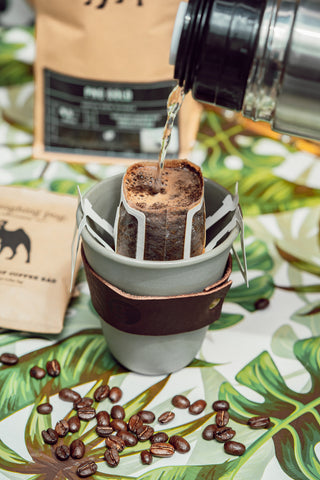Myth or Reality? Debunking 3 Biggest Misconceptions About Coffee and Breastfeeding for Mums
For many mums, soon-to-be-mums, and nursing mothers, wanting to drink coffee to feel awake and alert can be a common dilemma. On the one hand, you may crave the energy boost that caffeine provides, but on the other hand, you worry about how it may affect your baby through breastfeeding. This situation can be a source of anxiety and stress for many mothers, and it's understandable that you may feel unsure about what to do.
You might be surprised to learn that coffee and nursing can actually coexist without harming your baby!
We'll clarify some misconceptions about caffeine and breastfeeding, examine the impacts of caffeine on both mother and child and suggest ways for moderate caffeine consumption to support good health so you can make an informed decision about your coffee intake.
While we'll provide information to help debunk some of the common myths surrounding caffeine and breastfeeding, it's important to remember that this is based on research and general guidelines. The best course of action for you may vary depending on your individual circumstances, medical history, and other factors, so it's always best to seek medical advice from a professional before making any decisions.
We hope you can enjoy your favourite morning drink as you become more alert and focused and be able to take on the challenges of the day with renewed energy and enthusiasm. Whether you need to do chores, work from home, or simply care for your baby, you feel more capable and confident thanks to the power of coffee.
So, let's explore how your regular cup of joe can be a real game-changer for you and other breastfeeding mums!

Myth #1: Drinking Coffee While Breastfeeding Will Harm Your Baby
Many people think that the caffeine in coffee can cause a baby to become hyperactive, irritable, or have trouble sleeping. This belief has been passed down from generation to generation and is often reinforced by cultural beliefs or anecdotes from friends and family members.
Fact: Consuming caffeine in moderation does not harm the baby while breastfeeding.
The Australian Breastfeeding Association says that the amount of caffeine that enters breast milk is approximately 1% of what the mother consumes[1]. After consuming caffeine, the peak level of caffeine in breast milk is typically reached within 60 minutes.
Breastfeeding mothers can consume a moderate amount of caffeine (fewer than 300 milligrams or two to three cups of coffee per day according to the US Centers for Disease Control and Prevention[2]) without it having any effects on the baby's behaviour or sleep patterns.
Myth #2: Caffeine Causes Dehydration and Reduces Breast Milk Production
Lots of people believe that drinking coffee while breastfeeding can make you dehydrated and reduce your milk supply. They think that caffeine is a diuretic that can make you lose water and prevent your body from producing enough milk. This belief has been passed down for ages, and many mums are told to stay away from coffee so that they can make enough milk for their babies. However, the evidence to support these claims is not conclusive.
Fact: Moderate caffeine consumption does not cause dehydration or reduce breast milk production.
While caffeine is known to have a mild diuretic effect, meaning it may make you pee more, it's not enough to cause dehydration as long as you're drinking enough water throughout the day.
It's understandable that pregnant women and new mums may be hesitant to drink more water due to postpartum incontinence. However, it's important to note that staying properly hydrated is crucial for overall health, and drinking enough water can help prevent dehydration.
That said, it's essential to be mindful of caffeine intake and listen to your body to avoid worsening any symptoms of incontinence. If you are experiencing similar problems, it may be helpful to consider this when making a decision to consume caffeine or not. For further advice on management and treatment options, consulting a healthcare professional is recommended.
Additionally, there is no evidence that caffeine reduces breast milk production in nursing mothers. In fact, a study by the American College of Obstetricians and Gynecologists found that moderate caffeine intake had no effect on lactation in breastfeeding mothers[4].
So, don't stress too much about your coffee intake! As long as you're drinking plenty of water and sticking to a moderate amount of caffeine, you can still enjoy your favourite coffee drinks while nursing your little one. But, if you're ever concerned about your caffeine intake, it's always a good idea to talk to your healthcare provider.
Myth #3: Breastfed Babies are Sensitive to Caffeine
The myth that breastfed babies are sensitive to caffeine is based on the belief that caffeine consumed by a nursing mother can pass through breast milk and cause fussiness, sleep disturbances, or other adverse effects in the baby. Some people may also assume that because babies have a limited ability to metabolise caffeine, even small amounts in breast milk can be harmful.
Fact: Breastfed babies' sensitivity to caffeine can vary depending on several factors, including their medical history and overall health, but in general, they can metabolise caffeine.
The amount of caffeine that passes through breast milk to the baby is influenced by the mother's caffeine consumption, the baby's age, and their ability to metabolise caffeine[5]. Although some babies may not experience any adverse effects from their mother's caffeine intake, others may exhibit signs of irritability, fussiness, or difficulty sleeping.
According to Infant Risk Center, breastfeeding mothers should monitor their caffeine intake and observe their baby's behaviour and sleep patterns[6]. Breastfeeding mothers should be mindful of their caffeine consumption and pay attention to their baby's reactions. Look for our tips in our next section to see how you can change your caffeine intake if needed.

Tips on Healthy Coffee Consumption For New Mums
In this section, we will guide you through the world of healthy caffeine consumption while breastfeeding. Aside from limiting your caffeine intake, we’ll discover five other ways to help you strike the perfect balance and enjoy your coffee guilt-free while keeping your little one happy and healthy. Let's dive in!
- Time your caffeine consumption: To reduce the amount of caffeine that gets into your breast milk, time your caffeine consumption around your baby's feeding schedule. Try having your coffee after breastfeeding or pumping or give yourself at least 2 hours before breastfeeding your baby to prevent any negative impact on their sleep or behaviour. And if you want to catch some quality Z's yourself, avoid drinking coffee later in the day.
- Monitor your baby's reaction: Watch your baby's behaviour and sleep patterns closely to see if caffeine is causing any fussiness or trouble sleeping. If you notice any signs of irritation or restlessness, it might be time to cut back on your caffeine intake.
- Stay hydrated: It's important to finish at least 8 glasses daily to ensure your milk supply is flowing smoothly. Grab that water bottle and sip away! If you're experiencing postpartum incontinence, consider reducing your caffeine intake or avoiding it altogether, and speak to your healthcare provider for guidance on management and treatment options.
- Opt for brewed coffee with arabica beans: Instead of instant coffee, consider trying brewed coffee made from arabica beans, which have less caffeine than robusta beans commonly found in instant coffee. Additionally, instant coffee may also contain additives such as artificial sweeteners, flavourings, and preservatives, which may also be a concern for breastfeeding mums and their babies.
- Experiment with different brewing methods: Different brewing methods can affect the caffeine content and taste of coffee. Breastfeeding mums may want to experiment with different methods, such as drip coffee, French press, or pour-over, to find a method that produces a coffee that they enjoy with a caffeine content that is appropriate for them.
- Substitute with high quality decaf. Not all decaf has to taste bad; our Swiss Wash Columbian beans can cut down on your caffeine intake without the sacrificing the flavour.
At The Laughing Pug, we understand the importance of providing high-quality and delicious coffee options for mums who are breastfeeding. That's why we offer only specialty-grade beans at unbeatable prices, so you can enjoy a guilt-free cup of coffee that's safe for you and your baby. Whether it be our easy-to-prepare pour-over drip bags, whole beans, or ground coffee, we’ve got you covered!
Being a breastfeeding mum doesn't mean you have to give up your love for caffeine. However, it's essential to be mindful of your consumption to ensure both you and your little one are feeling good.

To sum it up, after exploring the facts and myths about breastfeeding mums and coffee, we can say that moderate caffeine consumption is safe for nursing mothers and their babies. It has no harmful effects on breast milk production, dehydration, or the baby's health.
However, excessive caffeine intake can cause jitteriness, irritability, and sleeping difficulties in both the mother and the baby. So, it's crucial to limit caffeine consumption while breastfeeding and monitor your baby's behaviour and sleep patterns. Always consult your healthcare provider if you have any concerns about your caffeine consumption while breastfeeding.


Leave a comment